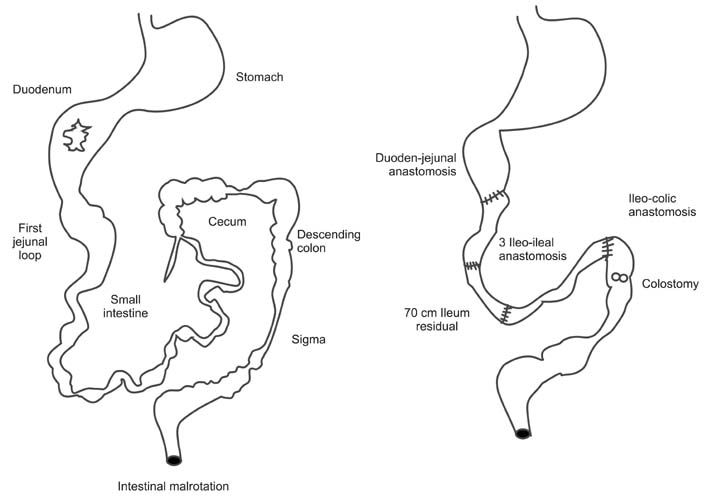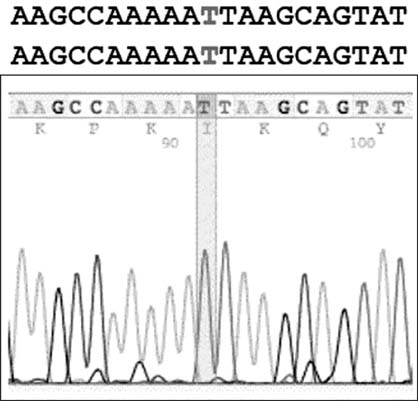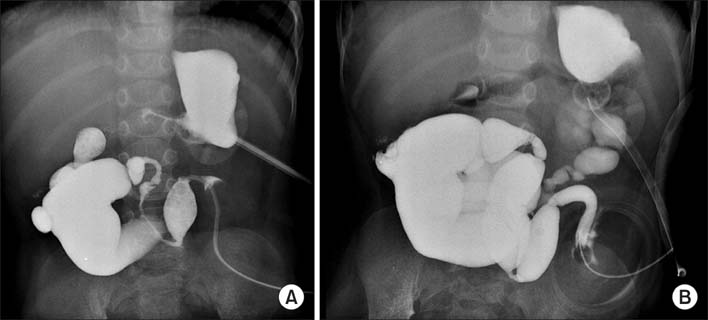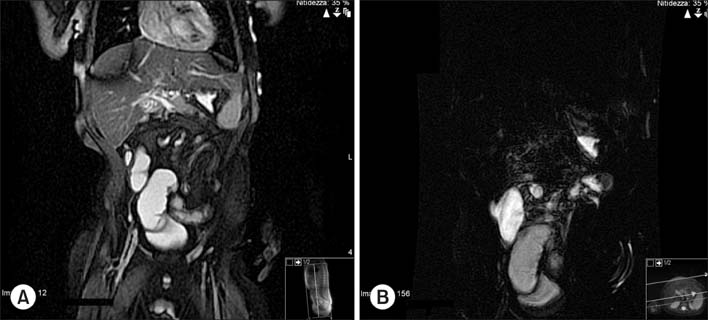Pediatr Gastroenterol Hepatol Nutr.
2014 Dec;17(4):257-262. 10.5223/pghn.2014.17.4.257.
The Complex Surgical Management of the First Case of Severe Combined Immunodeficiency and Multiple Intestinal Atresias Surviving after the Fourth Year of Life
- Affiliations
-
- 1Division of Pediatric General Surgery, University of Torino, Regina Margherita Children's Hospital, Torino, Italy. riccardoguan@gmail.com
- 2Division of Pathology, University of Torino, Regina Margherita Children's Hospital, Torino, Italy.
- 3Department of Pediatric and Public Health Sciences, University of Torino, Regina Margherita Children's Hospital, Torino, Italy.
- KMID: 2315501
- DOI: http://doi.org/10.5223/pghn.2014.17.4.257
Abstract
- Severe combined immunodeficiency (SCID) is a life-threatening syndrome of recurrent infections and gastrointestinal alterations due to severe compromise of T cells and B cells. Clinically, most patients present symptoms before the age of 3 months and without intervention SCID usually results in severe infections and death by the age of 2 years. Its association with intestinal anomalies as multiple intestinal atresias (MIA) is rare and worsens the prognosis, resulting lethal. We describe the case of a four year-old boy with SCID-MIA. He presented at birth with meconium peritonitis, multiple ileal atresias and underwent several intestinal resections. A targeted Sanger sequencing revealed a homozygous 4-bp deletion (c.313DeltaTATC; p.Y105fs) in tetratricopeptide repeat domain 7A (TTC7A). He experienced surgical procedures including resection and stricturoplasty. Despite parenteral nutrition-associated liver disease, the patient is surviving at the time of writing the report. Precocious immune system assessment, scrutiny of TTC7A mutations and prompt surgical procedures are crucial in the management.
MeSH Terms
Figure
Reference
-
1. Samuels ME, Majewski J, Alirezaie N, Fernandez I, Casals F, Patey N, et al. Exome sequencing identifies mutations in the gene TTC7A in French-Canadian cases with hereditary multiple intestinal atresia. J Med Genet. 2013; 50:324–329.
Article2. Avitzur Y, Guo C, Mastropaolo LA, Bahrami E, Chen H, Zhao Z, et al. Mutations in tetratricopeptide repeat domain 7A result in a severe form of very early onset inflammatory bowel disease. Gastroenterology. 2014; 146:1028–1039.
Article3. Chen R, Giliani S, Lanzi G, Mias GI, Lonardi S, Dobbs K, et al. Whole-exome sequencing identifies tetratricopeptide repeat domain 7A (TTC7A) mutations for combined immunodeficiency with intestinal atresias. J Allergy Clin Immunol. 2013; 132:656–664.4. Fischer RT, Friend B, Talmon GA, Grant WJ, Quiros-Tejeira RE, Langnas AN, et al. Intestinal transplantation in children with multiple intestinal atresias and immunodeficiency. Pediatr Transplant. 2014; 18:190–196.
Article5. Ali YA, Rahman S, Bhat V, Al Thani S, Ismail A, Bassiouny I. Hereditary multiple intestinal atresia (HMIA) with severe combined immunodeficiency (SCID): a case report of two siblings and review of the literature on MIA, HMIA and HMIA with immunodeficiency over the last 50 years. BMJ Case Rep. 2011; 2011. doi: 10.1136/bcr.05.2010.3031.
Article6. Moore SW, de Jongh G, Bouic P, Brown RA, Kirsten G. Immune deficiency in familial duodenal atresia. J Pediatr Surg. 1996; 31:1733–1735.
Article7. Moreno LA, Gottrand F, Turck D, Manouvrier-Hanu S, Mazingue F, Morisot C, et al. Severe combined immunodeficiency syndrome associated with autosomal recessive familial multiple gastrointestinal atresias: study of a family. Am J Med Genet. 1990; 37:143–146.
Article8. Gilroy RK, Coccia PF, Talmadge JE, Hatcher LI, Pirruccello SJ, Shaw BW Jr, et al. Donor immune reconstitution after liver-small bowel transplantation for multiple intestinal atresia with immunodeficiency. Blood. 2004; 103:1171–1174.
Article9. Agarwal NS, Northrop L, Anyane-Yeboa K, Aggarwal VS, Nagy PL, Demirdag YY. Tetratricopeptide repeat domain 7A (TTC7A) mutation in a newborn with multiple intestinal atresia and combined immunodeficiency. J Clin Immunol. 2014; 34:607–610.
Article
- Full Text Links
- Actions
-
Cited
- CITED
-
- Close
- Share
- Similar articles
-
- Correction: The Complex Surgical Management of the First Case of Severe Combined Immunodeficiency and Multiple Intestinal Atresias Surviving after the Fourth Year of Life
- Coincident Occurrence of Intestinal Duplication Cyst and Type I and Type II Intestinal Atresias
- Effect of cultured thymic epithelium transplantation in a patients with severe combined immunodeficiency
- Effect of interferon-gamma treatment on interstitial pneumonia in a patient with severe combined immunodeficiency
- Disseminated BCG Infection in a patient with Severe Combined Immunodeficiency





